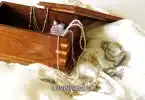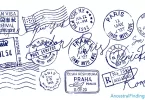It’s nice to keep family heirlooms in the family for generations. It offers the family a tangible sense of connection to the past, and teaches one generation to revere the objects, traditions, and Donate of the ones that came before them. Some families are able to do this for centuries, and have impressive collections of heirlooms and genealogical information as a result. However, this is rare, not the norm by any means. Most families discard things they consider “old,” especially if they never knew the person to whom they belonged, or were never even told of them. That is how so many antiques end up in antique stores, including orphan photographs of people from a century or more ago that are not labeled or identifiable (in most instances). The sad truth is many families just don’t see the value in these things and throw them away.
The good news is that you don’t have to depend on your family to save those heirlooms and all your research for you throughout the centuries. You can keep these things safe and available for use for future generations of your family who may care about them more than the ones you know now. You can ensure the protection and preservation of all of your work and the history of your family by donating it to a genealogical society or historical society. Here are three reasons why you should do it.
You Can’t Depend on Your Descendants to Care as Much About the Family History as You Do
Even if you have people in your family now who care about genealogy, you don’t know what your grandchildren, great-grandchildren, or later generations will feel about it, or if they will even care. You also don’t know if the people you’re teaching the family history to now will teach it to future generations, creating that sense of connection that is needed to keep up the sense of caring and responsibility for the family treasures. You don’t want all your hard work in genealogical research and all the photographs and heirlooms you’ve collected to one day end up in an antiques store or trash heap. Donating it to a genealogical or historical society will ensure the protection of all you’ve done with the family history work.
Accidents Happen
You can’t be sure there won’t be any disasters, natural or otherwise, that will destroy your genealogical work and your heirlooms. Earthquakes, fires, floods, and more can destroy all you have done and collected. Even if you keep your most precious papers and smaller heirlooms in a waterproof and fireproof safe (and you should), and have digital photos of them, you simply don’t know how bad the disaster will be and what will become of these things. They may be lost even if they survive the disaster. The archives of genealogical and historical societies are generally well-protected against such things, and provisions are made to move the collections to new, better locations if need be, before a disaster can destroy or damage them. Your work and heirlooms are safer in these places than anywhere else you could keep them.
Your Work Will Be Available to More People
Keeping your work in the family means just the immediate family has access to it. Donating it to a genealogical or historical society means anyone can access it who wants or needs to, such as distant family members, people researching local history or the residents of a particular time and place, and more. If you want your work to be shared with those who want to see it, then entrusting it to a society is the best thing you can do.
Deciding what society should get your work is a simple matter. Look at the scope of your work. Is it mainly local work, dealing with families in one town or area? Then, it should be donated to a local historical or genealogical society. If it is larger in scope and traces your family through many states, the country, or even the world, it should be donated to a regional or national genealogical or historical society. Whether the work is more historical or genealogical in scope will determine the type of society you should donate your collection to. Once you’ve decided on a place, talk to their curator about their security, how they keep their records, and once you’re satisfied your work will be protected, make arrangements for when and how your collection will be donated. You’ll be glad you did it.
– 7 Things You Need to Know Before Organizing Your Genealogy Heirlooms
– How to Find Family Members for Homeless Genealogical Artifacts
– Low Tech Record Keeping for Your Genealogical Research
– Organizing and Storage Tips for Your Genealogy Research
– How to Archive Family Keepsakes: Learn How to Preserve Family Photos, Memorabilia and Genealogy Records






